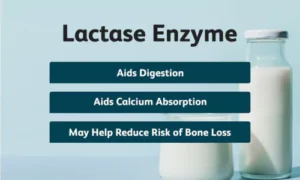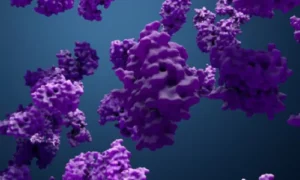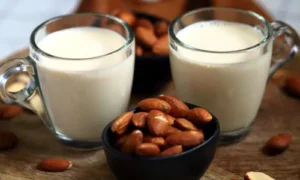Millions of individuals worldwide suffer from the common digestive ailment known as lactose intolerance. Although many people are aware of it, few are aware of how important digestive enzymes are to this illness. This blog will discuss the direct connection between lactose intolerance and enzymes, specifically lactase, as well as natural ways to control it.
What is Lactose Intolerance?

The inability to digest lactose, a naturally occurring sugar present in milk and dairy products, is known as lactose intolerance. Symptoms frequently consist of:
1. Bloating
2. Gas
3. Diarrhoea
4. Abdominal pain
These symptoms, which might vary in severity, typically manifest after consuming dairy products.
Why is Lactase Important and What Does it Do?

- One kind of digestive enzyme generated in the small intestine is lactase. Its primary function is to convert lactose into glucose and galactose, two simpler sugars that the body can absorb and use.
- The unpleasant symptoms of lactose intolerance result from lactose remaining undigested in the gut, where it is fermented by bacteria, due to insufficient lactase.
How Enzyme Deficiency Leads to Intolerance

Insufficient production of lactase by the body results in lactose intolerance. This lack of an enzyme may be:
- Primary: Usually declines naturally as people age.
- Secondary: As a result of disease or trauma to the small intestine.
- Congenital: An uncommon genetic disorder that manifests from birth.
The relationship between low lactase levels and poor lactose digestion is evident in each of these situations.
The Benefits of Enzyme Supplements

- Supplements containing the lactase enzyme are commonly accessible over the counter and can let consumers enjoy dairy products without experiencing any discomfort. These supplements help break down lactose by momentarily increasing lactase levels.
- They can considerably lessen symptoms when taken before dairy consumption.
How to Treat Lactose Intolerance Naturally

The following enzyme-supporting advice will help you naturally manage lactose intolerance:
1. Select lactose-free or low-lactose dairy products, such as yoghurt and hard cheeses.
2. Consume fermented foods to promote intestinal health.
3. To slow digestion, eat dairy products with other foods.
4. Consume meals high in probiotics to increase the activity of intestinal enzymes.
When to Consult a Physician

See a gastroenterologist if you have persistent digestive problems or are unclear if you are lactose intolerant. In addition to recommending tests, they can rule out other diseases such as milk allergies or irritable bowel syndrome (IBS).
Conclusion
Enzymes, particularly lactase, and lactose sensitivity are closely related. The body finds it difficult to handle lactose without this essential enzyme, which causes discomfort and digestive issues. Thankfully, many people may manage the disease and keep eating a balanced diet with awareness, dietary changes, and enzyme supplements.







animalfarmpdfHax
July 9, 2025George Orwell was a prophet of the 20th century. His warnings are still flashing red. Heed the warning. Read the text. Find an Animal Farm PDF. It is the most important thing you can read today. https://animalfarmpdf.store/ The Daring English Teacher Worksheets Answer Key Pdf Animal Farm
theawakeningpdfHax
July 9, 2025“The bird that would soar above the level plain of tradition and prejudice must have strong wings.” This quote defines the struggle of the protagonist. To see if Edna has strong enough wings, download the awakening pdf. The metaphor of flight and falling runs through the entire story. A digital version allows you to track every bird reference. It is a poetic and tragic motif. https://theawakeningpdf.store/ The Awakening Epub
tombofannihilationHax
July 9, 2025The “Death Curse” is the hook that brings the party to Chult. Resurrection magic fails, and those previously raised are withering away. This creates a time limit. The Tomb of Annihilation PDF outlines the daily effects of this curse. DMs must track this diligently. The digital text allows for easy monitoring of the timeline. It adds a layer of tension that is rare in D&D. Every long rest is a calculated risk. The PDF helps the DM enforce this pressure, constantly reminding the players that while they sleep, the Soulmonger is feeding, and the world is dying. https://tombofannihilationpdf.store/ Tomb Of Annihilation Board Game Pdf
tomsawyerpdfHax
July 9, 2025The Adventures of Tom Sawyer is a book that captures the essence of American youth. Mark Twain’s writing is brilliant and engaging. We offer a high-quality digital text for those who want to read the book on their devices. Our resource is designed to be easy to use. With a Tom Sawyer PDF, you can take the story with you on your travels or simply enjoy it at home, making classic literature more accessible than ever. https://tomsawyerpdf.store/ Mark Twain Tom Sawyer Pdf Türkçe
tombofannihilationHax
July 9, 2025Unlock the secrets of Chult. Tomb of Annihilation is a massive sandbox. The Tomb of Annihilation PDF is the guide. It details the locations, the monsters, and the history. DMs use the digital index to find information quickly. The book also features the “Meat Grinder” mode. The PDF explains the rules for this hardcore difficulty. It also details the final boss. The digital guide is essential for DMs who want to challenge their players to the limit. It is the ultimate resource for the ultimate adventure. https://tombofannihilationpdf.store/ Tomb Of Annihilation Complete Appendix D Pdf
Animal Farm Book Report Pdf
July 9, 2025Don’t let the farm animals fool you; this is a serious book for serious times. It deals with life and death issues. Take it seriously. Read the Animal Farm PDF. It will change how you view the news.
Animal Farm Full Book Pdf
July 9, 2025The enduring popularity of the book proves its truth. Lies do not last, but truth does. Orwell told the truth about power. Verify it for yourself with an Animal Farm PDF. It is a book that will never go out of print or out of style.
Kate Chopin The Awakening Analysis Pdf
July 9, 2025Edna’s relationship with her children is complex; she loves them but refuses to lose herself in them. This nuance is often lost in summary. To understand her perspective on motherhood, read the awakening pdf. The text explores the difference between loving one’s children and being defined by them. A digital version allows you to find and reflect on the specific passages that deal with this difficult topic.
D&D Tomb Of Annihilation Filetype Pdf
July 9, 2025Deep in the steaming jungles of Chult, the Death Curse rots the world. This is the premise of Tomb of Annihilation, a hardcore adventure for D&D 5e. DMs often search for the Tomb of Annihilation PDF to access its deadly content. The book features a massive hex map of the peninsula, filled with undead and ruins. The digital version allows for easy zooming on specific locations like the Peaks of Flame. It is an indispensable tool for running the exploration pillar of the game. With the PDF, you can quickly reference the random encounter tables that make every trek into the jungle a fight for survival.
onyxstormepubHax
July 9, 2025The third book in the Empyrean saga proves that Rebecca Yarros is a master storyteller. The pacing, the characters, and the world-building are all top-notch. The Onyx Storm epub is highly sought after by fans who can’t wait for the paperback. The emotional beats hit hard, leaving you reeling. The digital copy is perfect for binge-reading sessions. It is a fantasy masterpiece that deserves all the hype. https://onyxstormepub.ru/ Onyx Storm Epub Pdf
kingofwrathpdfHax
July 9, 2025For those who love the forced proximity trope, this book delivers on every level. Dante and Vivian are forced to present a united front to the world while fighting a war behind closed doors. The search for a King of Wrath PDF often leads readers to discover a community of fans who adore the complexity of these characters. It is not just about the spice, although there is plenty of that; it is about the vulnerability that slowly emerges. Watch as the walls around Dante’s heart come crashing down in the most spectacular way possible. https://kingofwrathpdf.ru/ King Of Wrath Doctype:pdf
onyxstormepubHax
July 9, 2025Betrayal is a bitter pill to swallow, and there is plenty of it in this book. The characters you love will hurt you, and the ones you hate will surprise you. The Onyx Storm epub captures all the drama in high definition. The magic system is expanded to include new and dangerous powers. The ebook is the ultimate way to experience this epic story. It is a book that you will want to read again and again. https://onyxstormepub.ru/ Onyx Storm Pdf Download Free Download
kingofwrathpdfHax
July 9, 2025There is a cinematic quality to the book. You can easily visualize the luxury cars, the designer clothes, and the brooding stares. It plays out like a high-budget movie in your head. Accessing the story via a King of Wrath PDF preserves this visual nature through descriptive writing. Ana Huang paints a picture of a world that is beautiful but cold, until love warms it up. It is an escapist fantasy that feels incredibly vivid and immersive. https://kingofwrathpdf.ru/ Wrath Of Kings Rules Pdf
thehungergamespdfHax
July 9, 2025Primrose Everdeen is the catalyst for the entire series. Her innocence is what Katniss fights to protect. The bond between the sisters is the emotional core that grounds the high-stakes action. It is a story about love as much as it is about war. To feel the weight of this relationship, you must read the book. Electronic copies, such as a PDF, allow you to keep this touching story close at hand on your mobile device. https://thehungergamespdf.ru/ The Hunger Games Read Online Free Pdf
King Of Wrath Vk Epub
July 9, 2025The balance between the external plot (blackmail/business) and internal plot (love/trust) is handled deftly. Neither overshadows the other. They work in tandem to drive the story. A King of Wrath PDF reveals this structural integrity. It is a well-crafted novel that functions on multiple levels. It satisfies the head and the heart.
The Hunger Games 3 Mockingjay Pdf Download
July 9, 2025Effie Trinket appears superficial, but she represents the ignorance of the Capitol citizens. Her obsession with manners in the face of death is both funny and disturbing. The satire in the book is sharp and biting. To catch all the satirical elements, one should read the text closely. A The Hunger Games pdf is a convenient format for those who like to read on their commute, allowing you to step into the bizarre world of the Capitol whenever you have a few minutes.